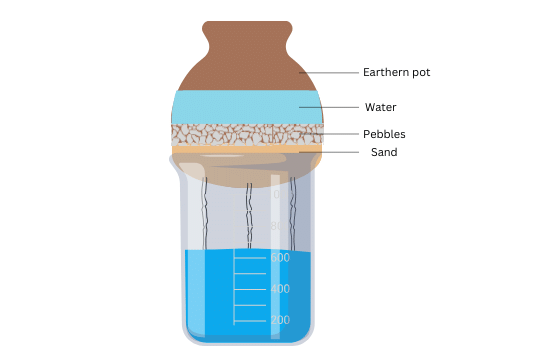Take an earthen pot (mutka), some pebbles and sand. Design a small-scale filtration plant that you could use to clean muddy water.
Answer:
Aim: To design a small-scale filtration plant to clean muddy water.
Materials Required: Earthen pot (mutka), some pebbles, sand, beaker, muddy water.
Procedure:
(i) Pierce three holes at the bottom of the earthen pot to allow water to escape.
(ii) Now place some sand in the earthen pot.
(iii) Place the pebbles uniformly as a bed on top of the sand.
(iv) Now gently place the earthen pot on a beaker of suitable size.
Observations: You will observe clean water flowing into the beaker while the mud is left behind on the filter bed.

Conclusions:
- The tiny pores of the earthen pot act as a natural filter by trapping mud particles and other impurities.
- The bed of pebbles removes the bigger particles from the water.
- The finer bed of sand removes the really fine particles from the water.
- In this way, we can successively filter the muddy water through various stages to obtain clean water in the beaker.
“Take an earthen pot (mutka), some pebbles and sand. Design a small-scale filtration plant that you could use to clean muddy water.” – Solved.
Solution to Activity 2.1
Solution to Activity 2.2
Solution to Activity 2.3
Solution to Activity 2.4
Solutions to Chapter 2 Is Matter Around Us Pure?


